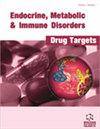Beneficial Effects of PIN1 Inhibition on Diabetes Mellitus: A Concise Review
IF 2
4区 医学
Q3 ENDOCRINOLOGY & METABOLISM
Endocrine, metabolic & immune disorders drug targets
Pub Date : 2024-05-02
DOI:10.2174/0118715303297663240307060019
引用次数: 0
Abstract
: Type 2 diabetes mellitus is a long-term medical illness in which the body either becomes resistant to insulin or fails to produce it sufficiently. Mostly, combinatorial therapy is required to control blood glucose levels. However, combinatorial therapy has detrimental side effects. The prevalence of the cases and subsequent increases in medical costs of the same intimidate human health globally. While there have been a lot of studies focused on developing diabetic regimens that work to lower blood glucose levels, their effectiveness is short-lived because of unfavorable side effects, such as weight gain and hypoglycemia. In recent years, the PIN1 (protein interacting with NIMA) enzyme has attracted the attention of researchers. Previous studies suggested that PIN1 may act on the various substrates that are involved in the progression of T2DM and also help in the management of diabetes-related disorders. Thus, the focus of the current review is to examine the correlation between PIN1, T2DM and its related disorders and explore the possibility of developing novel therapeutic targets through PIN1 inhibition.抑制 PIN1 对糖尿病的益处:简明综述
:2 型糖尿病是一种长期的内科疾病,患者的身体会对胰岛素产生抗药性或无法产生足够的胰岛素。大多数情况下,需要采用综合疗法来控制血糖水平。然而,综合疗法具有有害的副作用。这种疾病的发病率和随之而来的医疗费用的增加威胁着全球人类的健康。虽然有很多研究致力于开发能够降低血糖水平的糖尿病治疗方案,但由于不利的副作用(如体重增加和低血糖),这些方案的疗效都很短暂。近年来,PIN1(与 NIMA 相互作用的蛋白质)酶引起了研究人员的注意。以往的研究表明,PIN1 可能作用于参与 T2DM 进展的各种底物,也有助于糖尿病相关疾病的治疗。因此,本综述的重点是研究 PIN1、T2DM 及其相关疾病之间的相关性,并探讨通过抑制 PIN1 开发新型治疗靶点的可能性。
本文章由计算机程序翻译,如有差异,请以英文原文为准。
求助全文
约1分钟内获得全文
求助全文
来源期刊

Endocrine, metabolic & immune disorders drug targets
ENDOCRINOLOGY & METABOLISMIMMUNOLOGY-IMMUNOLOGY
CiteScore
4.60
自引率
5.30%
发文量
217
期刊介绍:
Aims & Scope
This journal is devoted to timely reviews and original articles of experimental and clinical studies in the field of endocrine, metabolic, and immune disorders. Specific emphasis is placed on humoral and cellular targets for natural, synthetic, and genetically engineered drugs that enhance or impair endocrine, metabolic, and immune parameters and functions. Moreover, the topics related to effects of food components and/or nutraceuticals on the endocrine-metabolic-immune axis and on microbioma composition are welcome.
 求助内容:
求助内容: 应助结果提醒方式:
应助结果提醒方式:


